|

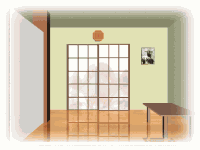
What
is Feng Shui?
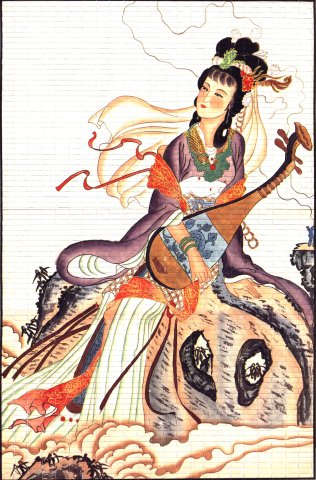 You
may have heard of this ancient Chinese skill
for creating a better living environment. Literally, Feng
means wind and Shui
means water. They are two of the basic elements of life and are continually in a state of
flux. Once they stop flowing and become static, they can create a negative Chi (energy).
If you live in an environment that
attracts negative energy, it will adversely affect your own
energy resulting in what you feel is "bad luck" in
which you will not enjoy good health and prosperity. (Your home
is an extension of yourself . . . think about this.) You
may have heard of this ancient Chinese skill
for creating a better living environment. Literally, Feng
means wind and Shui
means water. They are two of the basic elements of life and are continually in a state of
flux. Once they stop flowing and become static, they can create a negative Chi (energy).
If you live in an environment that
attracts negative energy, it will adversely affect your own
energy resulting in what you feel is "bad luck" in
which you will not enjoy good health and prosperity. (Your home
is an extension of yourself . . . think about this.)
Feng Shui
has a long history - well over 2000 years. It was used originally
for finding burial plots for the dead, called Yin
houses and was reserved exclusively for royalty
and the very wealthy. Emperors of China used the skills of a Feng
Shui master to find an
auspicious burial site which would ensure their future
generations would have good fortune. This
task took many years for the master to do.
Today, Feng
Shui is more commonly used by corporations and
private individuals interested in improving their health,
fortune, and quality of life.
How
does it work?
 Feng Shui deals
with both the internal and external environment. If the external
environment embraces negative energy, anything done internally
will not have a lasting effect. However, there are remedies to
alter or block negative Chi and
enhance positive Chi. The first
thing a Feng Shui master will
do is to make an external survey of the building or home, and
note anything that is or will cause problems. This could be the
surrounding buildings, homes, roadways, etc. He will then use the Lopan (Chinese compass) and
sketch a Shui chart, which involves a great deal of calculation. From his analysis, he will
ascertain which direction will bring positive or negative
influences. Each direction is associated with a particular star
and number that
has its own particular energy; i.e., the number
eight star corresponds with money. Other stars relate to illness, celebration,
success, relationships, luck (good or bad), popularity, birth and
death.
Feng Shui deals
with both the internal and external environment. If the external
environment embraces negative energy, anything done internally
will not have a lasting effect. However, there are remedies to
alter or block negative Chi and
enhance positive Chi. The first
thing a Feng Shui master will
do is to make an external survey of the building or home, and
note anything that is or will cause problems. This could be the
surrounding buildings, homes, roadways, etc. He will then use the Lopan (Chinese compass) and
sketch a Shui chart, which involves a great deal of calculation. From his analysis, he will
ascertain which direction will bring positive or negative
influences. Each direction is associated with a particular star
and number that
has its own particular energy; i.e., the number
eight star corresponds with money. Other stars relate to illness, celebration,
success, relationships, luck (good or bad), popularity, birth and
death.
 Interest
in
Feng Shui
has become worldwide. It is being used
by individuals and corporations alike. Those corporations in the
West, especially those with an Asian background or Asian
connections, utilize this ancient skill to give them an advantage
over their competitors. Good Feng Shui is
vital. Interest
in
Feng Shui
has become worldwide. It is being used
by individuals and corporations alike. Those corporations in the
West, especially those with an Asian background or Asian
connections, utilize this ancient skill to give them an advantage
over their competitors. Good Feng Shui is
vital.
 An integral part of Chinese Feng Shui is
the Ba Zi (Chinese horoscope).
This involves a detailed calculation using the birth date, place
and time of the head of the house or business.
Among other factors, this will determine what direction, colors,
and numbers are most beneficial for the individual concerned. All
of this is based on the five elements (the Chinese have an extra
element - wood). Learning to
understand and correctly calculate the chart with accuracy offers
a time frame for a favorable marriage, having children, when to
expect prosperity, good health, etc. An integral part of Chinese Feng Shui is
the Ba Zi (Chinese horoscope).
This involves a detailed calculation using the birth date, place
and time of the head of the house or business.
Among other factors, this will determine what direction, colors,
and numbers are most beneficial for the individual concerned. All
of this is based on the five elements (the Chinese have an extra
element - wood). Learning to
understand and correctly calculate the chart with accuracy offers
a time frame for a favorable marriage, having children, when to
expect prosperity, good health, etc.
 The
BA
GUA octagon is one of the tools used in Feng
Shui to help determine preferred locations for certain functions
in the home or office. The BA GUA is placed with the front door
of the floor plan of your home or office placed at the bottom of
the BA GUA octagon. The
BA
GUA octagon is one of the tools used in Feng
Shui to help determine preferred locations for certain functions
in the home or office. The BA GUA is placed with the front door
of the floor plan of your home or office placed at the bottom of
the BA GUA octagon.
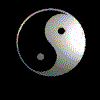 Yin and Yang Yin and Yang
All Chinese
beliefs, traditions, cultural practices, and superstitions are
base on the principle of dualism, or opposites. Yin
and Yang are respectively, the negative and
positive principles that govern all human existence.
 These
primordial forces are in opposition, and yet, when combined, they
symbolize perfect harmony. Yin and Yang are
represented pictorially by the universally known symbol of an egg.
The yolk and the white are strongly differentiated with the black
and white colors, which distinguish the dual forces.
Everything in the universe contains varying degrees of Yin and
Yang. Observe in the Yin/Yang symbol. There is a tiny bit of Yang
in the Yin and a tiny bit of Yin in the Yang emphasizing that
these two factors are always in a state of flux, thereby creating
change, even as they interact. These
primordial forces are in opposition, and yet, when combined, they
symbolize perfect harmony. Yin and Yang are
represented pictorially by the universally known symbol of an egg.
The yolk and the white are strongly differentiated with the black
and white colors, which distinguish the dual forces.
Everything in the universe contains varying degrees of Yin and
Yang. Observe in the Yin/Yang symbol. There is a tiny bit of Yang
in the Yin and a tiny bit of Yin in the Yang emphasizing that
these two factors are always in a state of flux, thereby creating
change, even as they interact.
Water for Wealth
Water
represents money and signifies the flow of wealth. To activate
this symbol of prosperity, focus on the flow of water as it
passes near you home. If you live in an apartment, relate the
flow of water to the whole building. There is a difference
between "big water", which generally describes rivers,
lakes, and seas, and "small water", or artificial ponds
and household drains.
Make sure
that the water (river, ponds,
or drains) is in full view of
the main front door; water flowing past the back of the property
suggests missed opportunities.
Make sure
that the water flows past the
main door in an auspicious direction. (These guidelines are based
on the Water Dragon formula).
Swimming Pools
 While
gardens are excellent Feng Shui, most modern Feng Shui masters
are ambivalent about their attitude toward swimming pools. One
group vehemently opposes the idea of having swimming pools
altogether, pointing to various examples of family fortunes lost
by the second generation and attributing the cause to the
presence of large swimming pools in the house. Ironically, these
luxury items have often been built as a sign of wealth.
Another group of masters maintains that pools
can be auspicious if they are
in proportion to the house, properly sited with respect to the
land, and if they are curved or kidney-shaped
and appear to embrace the house, rather than rectangular-shaped. While
gardens are excellent Feng Shui, most modern Feng Shui masters
are ambivalent about their attitude toward swimming pools. One
group vehemently opposes the idea of having swimming pools
altogether, pointing to various examples of family fortunes lost
by the second generation and attributing the cause to the
presence of large swimming pools in the house. Ironically, these
luxury items have often been built as a sign of wealth.
Another group of masters maintains that pools
can be auspicious if they are
in proportion to the house, properly sited with respect to the
land, and if they are curved or kidney-shaped
and appear to embrace the house, rather than rectangular-shaped.
 Pools in
apartments should not be located within the apartment block,
whether on the ground floor or on the top floor. Water above or
below spells danger and is
never encouraged by Feng Shui masters.
Pools should be balanced in size, and should reflect the harmony
of the elements. If your horoscope warns against the presence of
the water element in your home, i.e. if you are a fire
person (indicated by Chinese astrology) - it is
advisable that you not live with a pool on the property. Pools in
apartments should not be located within the apartment block,
whether on the ground floor or on the top floor. Water above or
below spells danger and is
never encouraged by Feng Shui masters.
Pools should be balanced in size, and should reflect the harmony
of the elements. If your horoscope warns against the presence of
the water element in your home, i.e. if you are a fire
person (indicated by Chinese astrology) - it is
advisable that you not live with a pool on the property.
Ponds

Ponds in
gardens are excellent Feng Shui.
If you have one, try keeping fish
in it to energize the flow of Chi
that it creates.
 If you are not able to care for you
pond properly, it is better to remove it altogether than to let
it become murky or muddy through lack of care. Chinese goldfish (nine
in number) are recommended. Eight should be red and gold
in color, while the ninth
should be black. If you are not able to care for you
pond properly, it is better to remove it altogether than to let
it become murky or muddy through lack of care. Chinese goldfish (nine
in number) are recommended. Eight should be red and gold
in color, while the ninth
should be black.
Waterfalls and Rock Gardens

Rock gardens and waterfalls enhance your garden.
They are not only beautiful but offer tranquility in the area.
SYMBOLS
 Great emphasis
is placed on the shape of hills and mountains, on the direction
of watercourses and, above all, on the careful location and
understanding of the lair of the dragon, China's most revered
celestial creature. The mighty dragon symbolizes great power to
the Chinese and many natural phenomena were explained in the old
days as manifestations of the dragon's moods. Great emphasis
is placed on the shape of hills and mountains, on the direction
of watercourses and, above all, on the careful location and
understanding of the lair of the dragon, China's most revered
celestial creature. The mighty dragon symbolizes great power to
the Chinese and many natural phenomena were explained in the old
days as manifestations of the dragon's moods.
The green dragon hills
should always be on the left, or the east of your home or site.
The red
phoenix hill should be found in low-lying land
in front of the site and this represents the footstool,
signifying a life of ease and luxury.
The black turtle hills
should lie behind to act as back support and protection.
The white
tiger hills should be on the right, or the
west, and merge with the green dragon to
create auspicious Chi.
 Good Feng Shui
is
associated with certain objects because of their colors or the
material from which they are made, or because their name in
Chinese is similar to desirable conditions, such as tranquility
or longevity. Having these objects in your home, or hanging a
painting on the wall depicting these objects, will help to bring
good fortune. Some of the most important objects and their
symbolism include:
Good Feng Shui
is
associated with certain objects because of their colors or the
material from which they are made, or because their name in
Chinese is similar to desirable conditions, such as tranquility
or longevity. Having these objects in your home, or hanging a
painting on the wall depicting these objects, will help to bring
good fortune. Some of the most important objects and their
symbolism include:
 Wealth,
which is symbolized by gold, antique coins, and the presence of
clean, clear, rippling water.
Wealth,
which is symbolized by gold, antique coins, and the presence of
clean, clear, rippling water.
 Wisdom is
represented by the elephant, Wisdom is
represented by the elephant,  which is regarded with great respect in many Asian
countries. which is regarded with great respect in many Asian
countries.
 Longevity and
good health, which is represented by bamboo,
pine trees, and cranes, which are often
depicted in Chinese art. Peaches also
symbolize longevity.
Longevity and
good health, which is represented by bamboo,
pine trees, and cranes, which are often
depicted in Chinese art. Peaches also
symbolize longevity.
 Crystals
Crystals 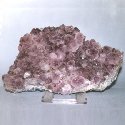 represent the earth
element,
which is the ruling symbol of the southwest marriage corner.
Activating this corner with a crystal will enhance one's social
life and marriage prospects. Although natural crystals are
beneficial in many aspects of daily living, they should never
be used in the northern sector
because they are detrimental to the career
corner since they symbolize earth, which is
believed to destroy the water element of this sector. represent the earth
element,
which is the ruling symbol of the southwest marriage corner.
Activating this corner with a crystal will enhance one's social
life and marriage prospects. Although natural crystals are
beneficial in many aspects of daily living, they should never
be used in the northern sector
because they are detrimental to the career
corner since they symbolize earth, which is
believed to destroy the water element of this sector.
If you seek prosperity in any form,
place your front door  in your Sheng Chi location. To
identify the four auspicious locations that will bring you
different kinds of good fortune and the four inauspicious
locations that must strenuously
be avoided, you first need to calculate your Kau
number.
in your Sheng Chi location. To
identify the four auspicious locations that will bring you
different kinds of good fortune and the four inauspicious
locations that must strenuously
be avoided, you first need to calculate your Kau
number.
(There
are various formulas you must familiarize yourself with - too
lengthy for this web page).
 Flowers
Flowers 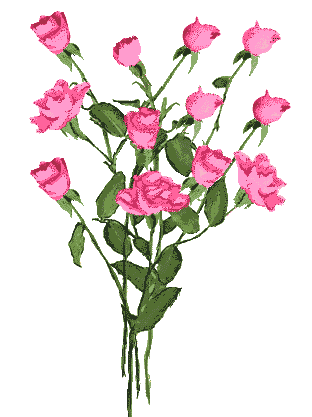 may be used for many
Feng Shui purposes. A wedding bouquet, even in silk, can be placed
in the southeast
or marriage corner
to enhance romantic prospects. may be used for many
Feng Shui purposes. A wedding bouquet, even in silk, can be placed
in the southeast
or marriage corner
to enhance romantic prospects.
 Wind chimes
hung above or near a door frighten away unlucky
Chi. They should be used in houses with too
many windows; otherwise, there will be dissent
between parents and children.
Wind chimes
hung above or near a door frighten away unlucky
Chi. They should be used in houses with too
many windows; otherwise, there will be dissent
between parents and children.
 Although
there is much to learn, Feng Shui
is neither difficult to understand nor hard to practice. Once you appreciate its underlying and basic tenets, you will begin to see
that Feng Shui adopts a sensible approach toward your
relationship with your environment and your personal living
space.
Although
there is much to learn, Feng Shui
is neither difficult to understand nor hard to practice. Once you appreciate its underlying and basic tenets, you will begin to see
that Feng Shui adopts a sensible approach toward your
relationship with your environment and your personal living
space.
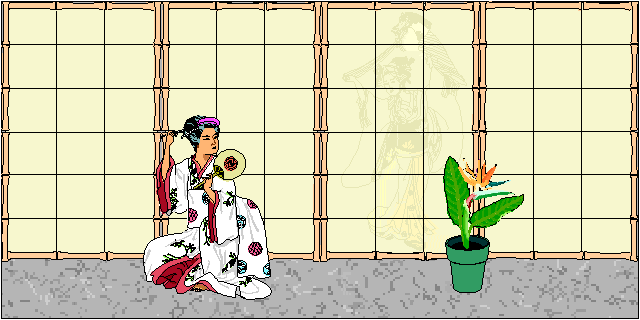
To all Astrologers
and those interested in Astrology:
 Feng Shui and
Chinese
Astrology are both based, to a large extent,
upon the I Ching and on the
interactions of the five elements.
Chinese astrology reveals the destiny bestowed by heaven or heaven
luck, while Feng Shui is linked to the
harnessing of the earth's Chi,
or earth luck. Feng Shui and
Chinese
Astrology are both based, to a large extent,
upon the I Ching and on the
interactions of the five elements.
Chinese astrology reveals the destiny bestowed by heaven or heaven
luck, while Feng Shui is linked to the
harnessing of the earth's Chi,
or earth luck.
 Chinese
Astrology
is based on the lunar calendar,
which dates back to the time of the Emperor Huang Ti (about 2600
B.C.). It divides time into 60-year cycles, made up of twelve
years and five elements. Each year is, therefore, linked to an
element. It is important to note that whereas the Western
calendar is based on the cycle
of the sun, and, therefore, New Year in the West
always falls on the 1st day of January, but the Chinese calculate
New Year according to the lunar cycle and, therefore, New Year
falls on the 2nd New Moon following the winter solstice. This
means that the lunar New Year can occur at any time between
mid-January and mid-February, and the Chinese calculate birth
years accordingly. (I hope this clears up the confusion - I know
it did for me.) Chinese
Astrology
is based on the lunar calendar,
which dates back to the time of the Emperor Huang Ti (about 2600
B.C.). It divides time into 60-year cycles, made up of twelve
years and five elements. Each year is, therefore, linked to an
element. It is important to note that whereas the Western
calendar is based on the cycle
of the sun, and, therefore, New Year in the West
always falls on the 1st day of January, but the Chinese calculate
New Year according to the lunar cycle and, therefore, New Year
falls on the 2nd New Moon following the winter solstice. This
means that the lunar New Year can occur at any time between
mid-January and mid-February, and the Chinese calculate birth
years accordingly. (I hope this clears up the confusion - I know
it did for me.)
 It is my endeavor to only acquaint you with
this discipline. I am not a consultant and
if you are interested in contacting a master,
you may search the web for contacts. It is my endeavor to only acquaint you with
this discipline. I am not a consultant and
if you are interested in contacting a master,
you may search the web for contacts.

|
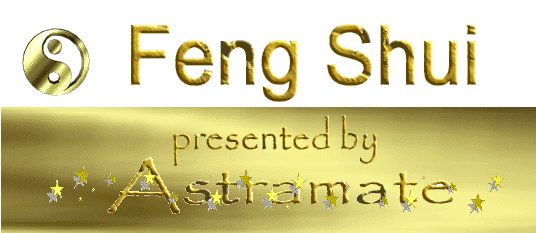



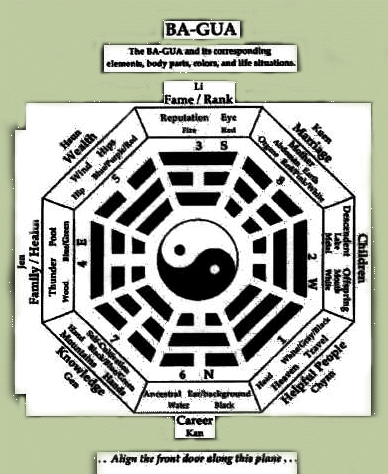
 Yin and Yang
Yin and Yang


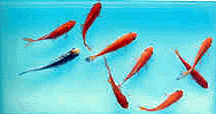
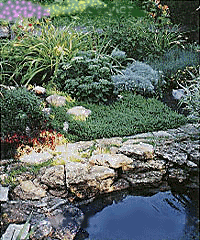
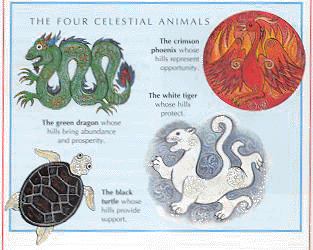
 which is regarded with great respect in many Asian
countries.
which is regarded with great respect in many Asian
countries. represent the earth
element,
which is the ruling symbol of the southwest marriage corner.
Activating this corner with a crystal will enhance one's social
life and marriage prospects. Although natural crystals are
beneficial in many aspects of daily living, they should never
be used in the northern sector
because they are detrimental to the career
corner since they symbolize earth, which is
believed to destroy the water element of this sector.
represent the earth
element,
which is the ruling symbol of the southwest marriage corner.
Activating this corner with a crystal will enhance one's social
life and marriage prospects. Although natural crystals are
beneficial in many aspects of daily living, they should never
be used in the northern sector
because they are detrimental to the career
corner since they symbolize earth, which is
believed to destroy the water element of this sector. may be used for many
Feng Shui purposes. A wedding bouquet, even in silk, can be placed
in the southeast
or marriage corner
to enhance romantic prospects.
may be used for many
Feng Shui purposes. A wedding bouquet, even in silk, can be placed
in the southeast
or marriage corner
to enhance romantic prospects.